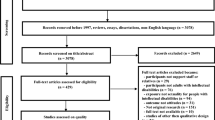Abstract
Many people with intellectual disability have limited sexual knowledge. Several assessment tools have been developed to assess the sexual knowledge of people with intellectual disability. This paper examines clinicians’ perspective on the usefulness and usability of these tools. This research uses a constructionist grounded theory approach. Semi-structured qualitative interviews were conducted with clinicians who use sexual knowledge assessment tools. To provide a context for clinicians’ comments about these tools, this paper also provides a content analysis of six sexual knowledge assessment tools. Several themes emerged from the interview data; (a) clinicians want to use sexual knowledge assessment tools to support their work, (b) clinicians want more guidance in relation to administering these tools, and (c) clinicians have concerns about the usefulness and usability of sexual knowledge assessment tools.
Similar content being viewed by others
References
World Health Organization: World Report on Disability. WHO/World Bank, Geneva (2011)
Galea, J., Butler, J., Iacono, T., Leighton, D.: The assessment of sexual knowledge in people with intellectual disability. J. Intellect. Dev. Disabil. 29(4), 350–365 (2004)
Johnson, K., Hillier, L., Harrison, L., Frawley, P.: Living Safer Sexual Lives: Final Report. Australian Research Centre in Sex, Health and Society, LaTrobe University, Melbourne (2001)
Jahoda, A., Pownall, J.: Sexual understanding, sources of information and social networks: the reports of young people with intellectual disabilities and their nondisabled peers. J. Intellect. Disabil. Res. 58(5), 430–441 (2014). doi:10.1111/jir.12040
Thompson, V.R., Stancliffe, R.J., Broom, A., Wilson, N.: Barriers to sexual health provision for people with intellectual disability: a disability service provider and clinician perspective. J. Intellect. Dev. Disabil. 39(2), 137–146 (2014)
Van Schrojenstein Lantman-de, H.M., Metsemakers, J.F., Haveman, M.J., Crebolder, H.F.: Health problems in people with intellectual disability in general practice: a comparative study. Fam. Pract. 17, 405–407 (2000)
Healy, E., McGuire, B.E., Evans, D.S., Carley, S.N.: Sexuality and personal relationships for people with an intellectual disability. Part I: service-user perspectives. J. Intellect. Disabil. Res. 53, 905–912 (2009)
Lafferty, A., McConkey, R., Simpson, A.: Reducing the barriers to relationships and sexuality education for persons with intellectual disabilities. J. Intellect. Disabil. 16, 29–43 (2012). doi:10.1177/1744629512438034
Abbott, D., Howarth, J.: Still off-limits? Staff views on supporting gay, lesbian and bisexual people with intellectual disabilities to develop sexual and intimate relationships? J. Appl. Res. Intellect. Disabil. 20, 116–126 (2007). doi:10.1111/j.1468-3148.2006.00312.x
Thompson, V.R., Stancliffe, R.J., Wilson, N.J., Broom, A.: Clinicians use of sexual knowledge assessment tools for people with intellectual disability. J. Intellect. Dev. Disabil. (2016). doi:10.3109/13668250.2016.1164303
Family Planning Victoria: The Human Relations and Sexuality Knowledge and Awareness Assessment: For People with an Intellectual Disability. FPV, Melbourne (1997)
Butler, J., Leighton, D., Galea, J.: The Assessment of Sexual Knowledge. Centre for Developmental Disability Health Victoria, Melbourne (2003)
McCabe, M.P.: Sexual Knowledge, Experience and Needs Scale for People with Intellectual Disability (SexKen-ID). Psychology Research Centre, Deakin University, Melbourne (1994)
Griffiths, D., Lunsky, Y.: The Socio-Sexual Knowledge and Attitude Assessment Tool Instruction Manual. Stoelting, Wood Dale (2003)
Talbot, T.J., Langdon, : A revised sexual knowledge assessment tool for people with intellectual disabilities: is sexual knowledge related to sexual offending behaviour? J. Intellect. Disabil. Res. 50(7), 523–531 (2006). doi:10.1111/j.1365-2788.2006.00801.x
Fraser, J.: Sexual Knowledge and Behaviour Assessment Tool. Me and Us, Sedbergh (2010)
Stancliffe, R.J., Wilson, N., Bigby, C., Balandin, S., Craig, D.: Responsiveness to self-report questions about loneliness: a comparison of mainstream and intellectual disability-specific instruments. J. Intellect. Disabil. Res. 58(5), 399–405 (2014)
Strauss, A.L., Corbin, J.: Basics of Qualitative Research: Techniques and Procedures for Developing Grounded Theory, 2nd edn. Sage, Thousand Oaks (1998)
Arksey, H.: Semi structured and unstructured interviewing. In: Becker, S., Bryman, A. (eds.) Understanding Research for Social Policy and Practice: Themes, Methods and Approaches, pp. 268–275. Policy Press, Bristol (2004)
Charmaz, K.: Constructing Grounded Theory: A Practical Guide Through Qualitative Analysis. Sage, London (2006)
Thompson, V.R., Stancliffe, R.J., Broom, A., Wilson, N.J.: Clinicians’ Perspectives on the Use and Usefulness of Sexual Knowledge Assessment Tools. Paper Presented at the 48th Annual Australasian Society for Intellectual Disability Conference, Sydney, NSW, Australia (2013)
Perry, J.: Interviewing people with intellectual disabilities. In: Emerson, E., Hatton, C., Thompson, T., Parmenter, T.R. (eds.) The International Handbook of Applied Research in Intellectual Disabilities. Wiley, Chichester (2004). doi:10.1002/9780470713198.ch5
Schaafsma, D., Kok, G., Stoffelen, J.M.T., Van Doorn, P., Curfs, L.M.G.: Identifying the important factors associated with teaching sex education to people with intellectual disability: a cross-sectional survey among paid care staff. J. Intellect. Dev. Disabil. 39(2), 157–166 (2014). doi:10.3109/13668250.2014.899566.x
Acknowledgements
This research was mostly conducted without funding, except for a small amount of Postgraduate Research Support Scheme funding from the University of Sydney’s Faculty of Health Sciences, which was used for professional transcription of recorded interviews. There was no restriction on free access to or publication of research data.
Author information
Authors and Affiliations
Corresponding author
Ethics declarations
Conflict of interest
None.
Rights and permissions
About this article
Cite this article
Thompson, V.R., Stancliffe, R.J., Wilson, N.J. et al. The Content, Usefulness and Usability of Sexual Knowledge Assessment Tools for People with Intellectual Disability. Sex Disabil 34, 495–512 (2016). https://doi.org/10.1007/s11195-016-9458-4
Published:
Issue Date:
DOI: https://doi.org/10.1007/s11195-016-9458-4




